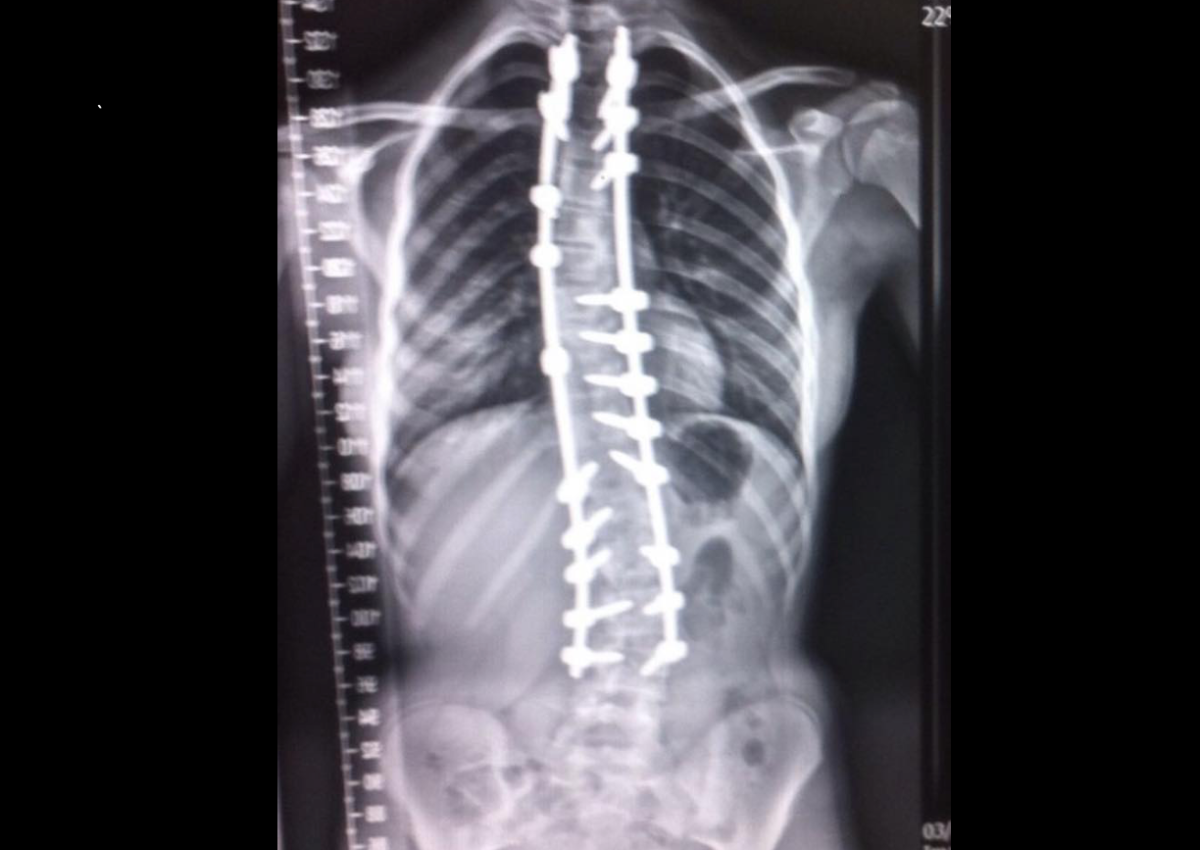‘A physical or mental condition that limits a person’s movements, senses, or activities; (as a mass noun) the fact or state of having such a condition.’ (OED).
The word ‘disability’ is all around me: my DAS application, my JCR role, and my medical records. Yet, I have never read the word and thought ‘Yes, that’s exactly it, that’s exactly how I feel’.
I stare, puzzled, unsure of what to make of this definition. ‘Limits’. What is considered a limitation? To what extent must you be ‘limited’ to be considered disabled? It feels odd having a label that categorises you by a standard of limitation, a set of fixed parameters with no regard of nuance.
When my spine was newly fused, 2 rods and 22 screws holding me rigidly in place, I cried because I couldn’t tie my shoelaces. My arms just couldn’t reach, the space hanging between them and my feet thick and impassable. In those first weeks, I mourned my mobility, my old self. This is a sentence I wrote in my notes app at the time:
‘I just want to be able to pull my knees to my chest without using my hands and without feeling pain’ (31/01/2021).
For me, the term ‘disabled’ does not say much. It is not a testament to how I feel or my experiences. The surgery that made me able to walk seriously crippled me in other ways. While I am free of certain limitations, others have been placed upon me. I am not disabled, and I am. When I arrived at university, I believed I was fully abled. I was told that I was lucky I could walk upright. And yet, I couldn’t carry a backpack. I could not venture out to libraries or do my weekly shop. The reality of my newfound freedom was bound to 4 walls.
My support plan quickly made me swallow a painful truth: I am not fully abled, I need support. Looking back, I am thankful for the help I received, both from tutors and DAS, that has meant I can live and study here. Despite this, to access support I must define myself as disabled. I did not come to the label organically, it was imposed on me. I was assessed, judged, and deemed to be ‘limited’ enough.
I feel perpetually trapped. On the one hand, I am able. I have access to lectures online and ergonomic equipment that allows me to sit at a desk and study. Yet my crippling chronic pain lodges itself behind my shoulders. I don’t sleep well; the stairs to my room are never-ending. A support plan will never hold all of the answers.
On the outside, friends forget. They apologise, ‘Oh my god, I’m so sorry I didn’t even realise’, when I have to stop walking to sit down. I endure hours standing at a concert, gritting my teeth to stop myself from crying, not wanting to bother anyone or ruin the moment. I feel like a burden. I don’t think they fully see me, understand me. They don’t mean it, yet I am reminded of my invisibility: this world was not built for me, not built to be accessible.
I try to open up sometimes. Stock phrases meet me: ‘How brave of you! How strong!’ I am congratulated as if I’d run a marathon, a chrome medal dangling from my neck. I cannot take off the medal, though, the metal is fused to my spine. I haven’t completed anything; it is a part of my body. I am not strong of my own volition. I was a terrified 14-year-old who sobbed when wheeled to theatre, who didn’t want to leave their mum, who didn’t want to be alone.
All of these thoughts layer one on top of the other, and I have no clue what to think. My impeccable posture reminds me that my spine is straight now, I can breathe deeply, but I cannot twist my back to see behind me. I am thankful for the life I have, yet I envy my fully-abled friends. I want to talk about my experiences without being defined by them. I am either perceived as my disability, or it is not acknowledged at all. I am either an object of pity or one of strength. I feel confined to a box that does not speak for me or my feelings, yet I must be placed in it so that I can exist.
There is no way to express succinctly how I feel about my relationship with my disability. I think that, in a way, that’s the point. The word ‘disability’ will never encapsulate my feelings and I don’t think that any other word would be better. In fact, I don’t think a single word will ever be sufficient in explaining how I feel, or how anyone else who lives with a disability feels. People’s experiences, my experiences, cannot be boiled down to a single word or a set of ‘limits’; we are so much more. I want to be seen this way, as a person with a disability. I want to be listened to, heard, and understood by those around me. Recognised as an individual.
I am not a scar, or an x-ray, or good posture. Yes, these things do make up a part of me, but that’s exactly it. While my scar is visible slithering up my spine, it is not my whole.

